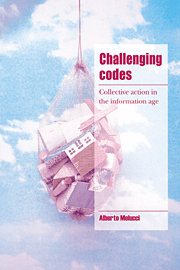Book contents
- Frontmatter
- Contents
- Preface and acknowledgements
- Introduction
- Part I Theory of collective action
- Part II Contemporary collective action
- Part III The field of collective action
- Part IV Acting collectively
- 15 Mobilization and political participation
- 16 The organization of movements
- 17 Leadership in social movements
- 18 Collective action and discourse
- 19 Forms of action
- 20 Research on collective action
- References
- Index
17 - Leadership in social movements
Published online by Cambridge University Press: 23 November 2009
- Frontmatter
- Contents
- Preface and acknowledgements
- Introduction
- Part I Theory of collective action
- Part II Contemporary collective action
- Part III The field of collective action
- Part IV Acting collectively
- 15 Mobilization and political participation
- 16 The organization of movements
- 17 Leadership in social movements
- 18 Collective action and discourse
- 19 Forms of action
- 20 Research on collective action
- References
- Index
Summary
The leader-constituency relationship
Processes of mobilization and the organizational structure of a movement are fuelled by the action of the movement's leaders. It is the leadership which promotes the pursuit of goals, develops strategies and tactics for action, and formulates an ideology. The penetration of the movement in the society, the loyalty and involvement of its members, and the consensus of different social groups all depend upon the leaders' actions.
Contributions to a theory of leadership in social movements have remained extremely sketchy. Studies on the topic have been conducted mainly by social psychologists analysing small groups and interpersonal relations, or by sociologists of organizations and researchers specializing on management (for a synthesis of recent developments, see Hunt 1991; Sims and Lorenzi 1992; Bryman 1992). The organizational models developed in these contexts have been subsequently applied in political sociology, through the analysis of leadership in political parties. The processes of leadership are frequently addressed in studies of social movements but systematic elaboration of this dimension is, however, still limited (see, for example, Downton 1973; Paige 1977; Loye 1977). The aim of the present chapter is to take a step in this direction, utilizing the available findings and attempting to apply them specifically to the theme of movements. The focus of my analysis will be on processes of formation of leadership and the relations between the leadership and the support base, the components of the action of the leadership, and its integrative and innovative role.
- Type
- Chapter
- Information
- Challenging CodesCollective Action in the Information Age, pp. 332 - 347Publisher: Cambridge University PressPrint publication year: 1996

